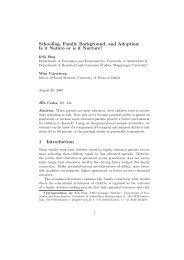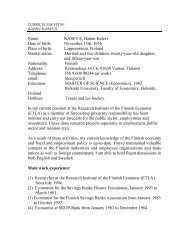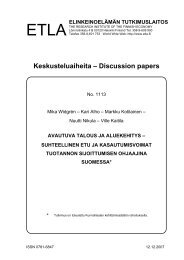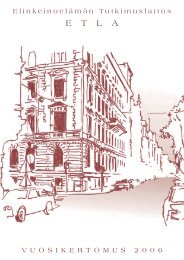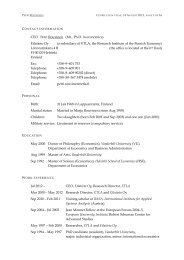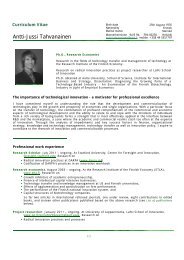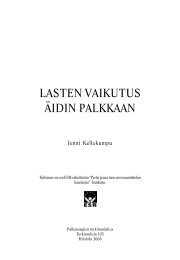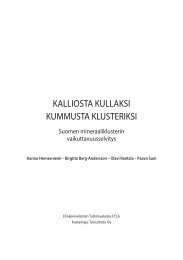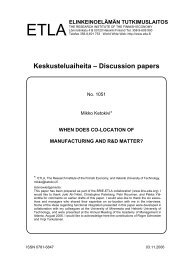Sergey Boltramovich, Grigory Dudarev, and Vladimir Gorelov ... - Etla
Sergey Boltramovich, Grigory Dudarev, and Vladimir Gorelov ... - Etla
Sergey Boltramovich, Grigory Dudarev, and Vladimir Gorelov ... - Etla
You also want an ePaper? Increase the reach of your titles
YUMPU automatically turns print PDFs into web optimized ePapers that Google loves.
13<br />
sharp decrease in government orders <strong>and</strong> low competitiveness of its<br />
products on the world market. Due to that metal-working also experienced<br />
deep recession. On the other h<strong>and</strong>, the metallurgy enterprises,<br />
to a large extent oriented at primary metal products, made the most of<br />
the new opportunities to take the lead in the cluster. As a result, the<br />
slump in production experienced by the metallurgy was relatively<br />
small, compared to other Russian industries.<br />
Table 3.1<br />
Ferrous Metallurgy Output in Northwest Russia in<br />
1990-2000, Thous<strong>and</strong> Tons<br />
1990 1996 1998 1999 2000<br />
Iron ore 20,998 12,417 13,792 14,527 14,153<br />
Steel 13,342 9,510 9,110 9,680 10,222<br />
Rolled metal 10,922 7,778 7,730 8,196 8,662<br />
Coated sheet <strong>and</strong> plate 284 456 466 469 468<br />
Steel shapes (high accuracy) 70.5 19.9 22.1 19.1 26.5<br />
Steel pipes 406 168 189 229 283<br />
Wares of special types of steel 107 42.3 48.7 55.8 79.3<br />
Source: Goskomstat (Russian State Committee for Statistics), 2001<br />
Favourable conditions for exports after the financial crisis of the<br />
August 1998 promoted the growth of metallurgy sector, <strong>and</strong> at present<br />
production volumes by many positions are not far from those achieved<br />
before the Transition period. However, the current situation in the sector<br />
is not stable due to increased dependency on world market conditions<br />
<strong>and</strong> political issues. The slow growth of the main metalconsuming<br />
industries (heavy machine building, construction) noted<br />
during the last few years cannot as yet substantially exp<strong>and</strong> the domestic<br />
market for the companies of the cluster.<br />
During the transition period metal sector has undergone sweeping<br />
privatisation. Presently, property redistribution is still continuing, the<br />
business is characterised by low transparency, <strong>and</strong> a large number of<br />
shadow <strong>and</strong> criminal operations take place.<br />
Territorial <strong>and</strong> production gap between metallurgy <strong>and</strong> metalworking<br />
inherited from the Soviet period still exists. Metal-working still<br />
combines with machine-building, <strong>and</strong> often occupies leading positions<br />
in export volumes of large machine-building companies owing to<br />
higher export potential.



